How Cleveland and Philadelphia Are Gearing Up for the Conventions
Cleveland and Philadelphia are bracing for tens of thousands of visitors.

— -- The Republican and Democratic National Conventions are less than four months away, and it’s not just the candidates who are getting ready.
Both host cities are sprucing up their streets and stepping up their security in advance of the nominating conventions. But the prospect of hosting tens of thousands of delegates, elected officials, media, volunteers and curious visitors is no small undertaking.
Here’s a look at how Cleveland and Philadelphia are gearing up for the big events:
Cleveland
Cleveland is on track to host one of the most memorable GOP conventions in decades. But the Rock ‘n’ Roll Capital of the World began preparations for the big event more than a year before the real prospect of a contested convention.
The city scored the Republican National Convention in July 2014, beating out Dallas as host. Since then, the convention’s organizers, led by the RNC Committee on Arrangements with the Cleveland 2016 Host Committee, say they have been “hard at work.”
“The vision from the very day we were awarded the convention [has been] providing the 50,000-plus visitors with the best experience” of Cleveland, Emily Lauer, Cleveland 2016 Host Committee spokeswoman, told ABC News.
Less than 100 days out, the organizers say they “are absolutely on track to get this done.”
“I feel extremely confident in where our community is in the planning for the convention,” Host Committee President and CEO David Gilbert said at a news conference Friday.
The Quicken Loans Arena, typically the domain of NBA great LeBron James, is on its way to becoming a delegate hall, according to Jeff Larson, CEO of the Committee on Arrangements. Come July 18, it will have its seats removed, its suites converted, and it will be ready to see the final contest between the Donald Trump, Ted Cruz and John Kasich campaigns.
The Host Committee has raised $55.5 million of its $64 million obligation to the Republican National Committee, Gilbert said. They’ve enlisted 7,400 of 8,000 volunteers to serve as “regional ambassadors” and give a “human perspective” to the city, Lauer added.
Cleveland has seen a $3.5 billion investment in visitor infrastructure in the past five years, according to Lauer, which has helped the organizers secure more than 16,000 hotel rooms across downtown and the suburbs. Lauer told ABC that a “few key projects have been accelerated” in preparation of the event. They’ve also seen more than 2,000 businesses register as part of the convention’s supplier guide.
Perhaps the biggest unknown, however, is security.
Despite increased chatter of a contested convention and the specter of violence, the planners are adamant that they are making adequate preparations.
“The police department, the Secret Service, the other local county and state authorities are on top of this thing,” Steve King, chairman of the Committee on Arrangements, said. “From almost day one, when you have 17 candidates you always have to make plans and always as part of our planning process we have contingencies and had some since day one.”
As a National Security Special Event, the U.S. Secret Service has the lead on arrangements. The convention will have a number of Secret Service provisions, including a security perimeter around the arena. The bounds of this perimeter have not yet been determined. Last month, the Secret Service nixed a petition to allow the open-carry of guns inside of the venue.




